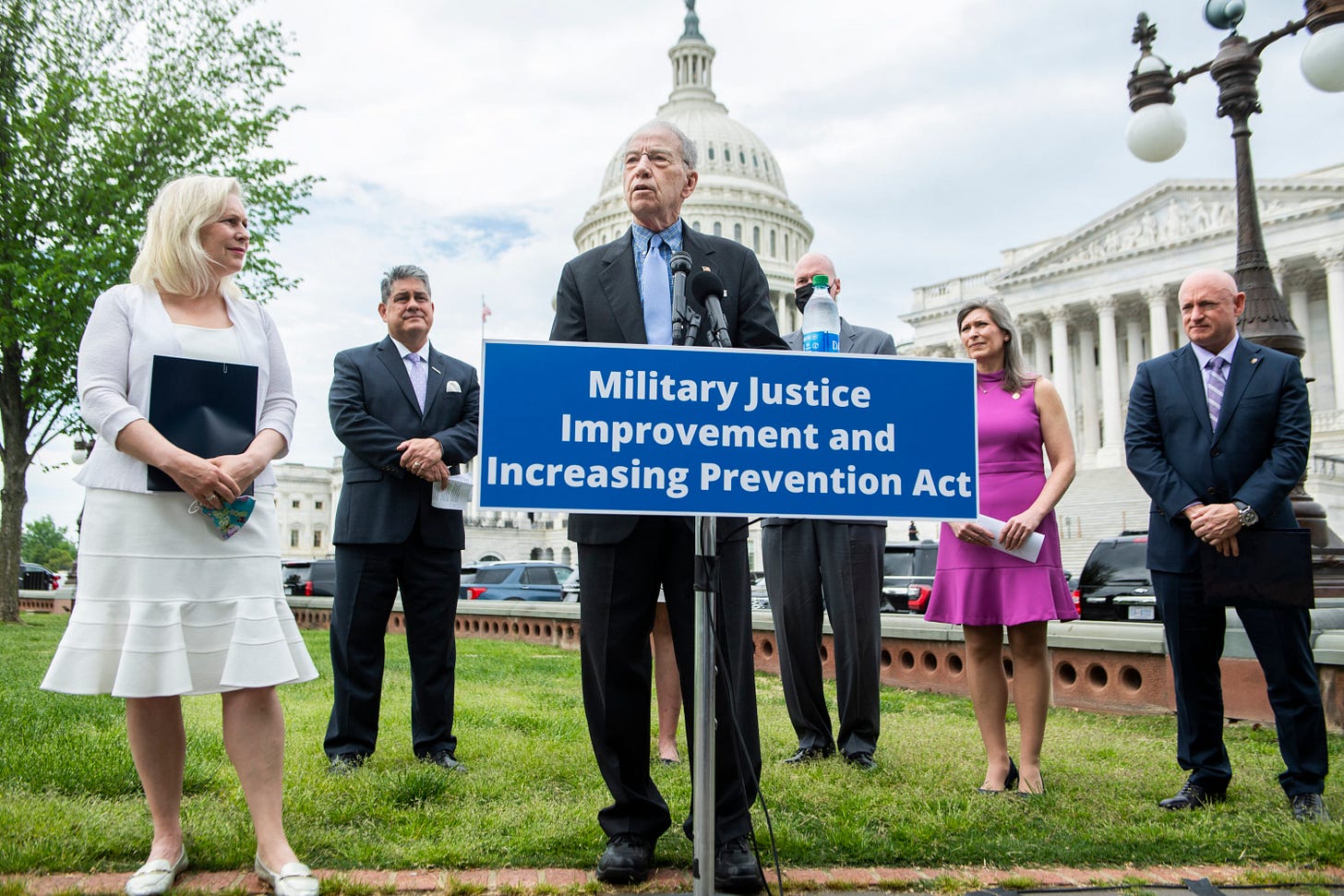In Military Justice, It’s Time to Leave Lawyers’ Work to Lawyers
Too many critical decisions are left in commanders’ hands.

Legislation that would reform aspects of the military justice system, chiefly relating to the prosecution of sexual assault and other major offenses, has been gaining momentum in recent months. Several prominent critics—such as the chairman of the Joint Chiefs of Staff, Gen. Mark Milley—have dropped or limited their opposition to the bill sponsored by Sens. Kirsten Gillibrand (D-N.Y.) and Joni Ernst (R-Iowa). And with last week’s markup of the bill by the full Senate Armed Services Committee, attention now shifts to the House of Representatives, where a similar measure is under consideration. That the hand-to-hand lobbying combat, including personal telephone calls from the secretary of defense, is reaching a climax is understandable, but members of Congress should focus on what is important rather than yield to vague claims about the mystical nature of military and naval command or the dreaded possibility of unanticipated consequences.
The core issue is whether the power to initiate criminal proceedings against military personnel should be wielded by commanders, few if any of whom have law degrees, or by judge advocates who have such degrees (the result of three years of intensive study) and are admitted to practice before a state or federal court. Secondarily, there is an issue as to whether some cases should remain subject to prosecution decision-making by commanders.
These issues have been studied long enough.
The impetus for congressional attention was concern over the continued pattern of sexual assaults on military personnel by other military personnel. Some legislators of both parties have decided to support change because of concerns over the failure of the armed forces to get a handle on sexual assault. Some opponents of the bill have attempted to pick holes in the Defense Department’s data on sexual assault. There is of course nothing wrong with trying to get as good a sense as possible of the actual number, but if that number proves to be, say, 10,000 incidents per year, rather than the 20,500 that the Pentagon estimates, Congress would still have every reason to act. There is general agreement that the number, whatever it is, is too high. No one in a position of responsibility in the Department of Defense disagrees.
More recently, attention has come to focus on racial disparities in court-martial charging, sentencing, or both. Like sexual assault, this is a matter of tremendous and understandable concern, and members of Congress should be aggressive in getting to the bottom of this and doing something.
As urgent as these concerns are, however, the central issue with the system for charging decisions under the Uniform Code of Military Justice both predates and transcends them. To put things in plain English, in 2021, in the United States, whether to charge any person with a serious criminal offense (which I would define as anything that could lead to more than a year in jail) is lawyers’ work—and virtually no military commanders currently exercising prosecutorial discretion are lawyers.
Could the training of nonlawyers paper over this flaw? Thanks to the Government Accountability Office, we now have at least a little information about just what UCMJ training military commanders receive. A recent report reveals that new Army brigadier generals receive one hour of training in military justice generally and an additional half-hour of training on the critical topic of unlawful command influence (UCI). UCI is rightly described as “the mortal enemy of military justice,” and these issues continue to reach the military appellate courts like clockwork.
The level of training disclosed by the GAO report is plainly inadequate. And it can’t be made adequate so long as military charging decisions are made by nonlawyers. Law school takes three years, not ninety minutes. Even if training were dramatically expanded, prosecution decisions need to be governed by enforceable ethical standards of the kind that apply to every attorney. There are no comparable standards for nonlawyers. What’s more, even if training could be drastically increased, do we really want our senior military commanders to be spending scarce time on these matters? For that matter, do they?
It also makes no sense to segregate sex cases and leave other major offenses to nonlawyer commanders. Should nonlawyers decide whether a potentially capital case should be tried, or whether the death penalty should be sought? What about some other charge that is likely to entail difficult and at times novel issues of law, evidence, or constitutional rights? How many commanders are in a position to decide whether a cybercrime or other complex fraud has occurred?
Opponents of change argue that commanders must have some say in who gets tried for what. No one can argue against that, but that is quite different from saying they need to have the final say. The system that would be in place if the pending reforms are enacted should make provision for commanders to express their views if anything about an accused or a case or conditions in a particular unit might bear on the proper disposition. And those views should be provided to the accused and any victim, so they, too, may comment if warranted. In short, commanders can have their say. In fact, they ought to.
Finally, other countries with effective fighting forces and democratic traditions have abandoned commander-centric charging without detriment to their ability to conduct military operations. Their reasons for doing so have not been concern over sex offenses or racial disparities, but because of the growing global recognition of the importance of having a military justice system that is both independent and impartial.
Pick your reason. But all the roads lead to reform. The House Armed Services Committee should report out a reform measure that will give our armed forces a single, simple system in which they, we, and Congress, can have confidence.

